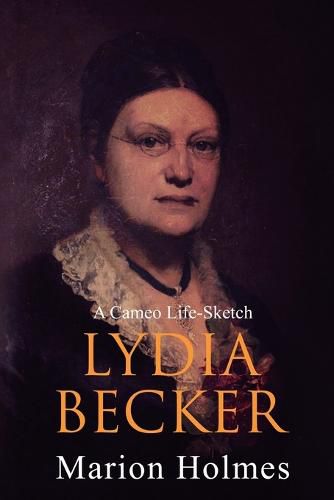Readings Newsletter
Become a Readings Member to make your shopping experience even easier.
Sign in or sign up for free!
You’re not far away from qualifying for FREE standard shipping within Australia
You’ve qualified for FREE standard shipping within Australia
The cart is loading…






This title is printed to order. This book may have been self-published. If so, we cannot guarantee the quality of the content. In the main most books will have gone through the editing process however some may not. We therefore suggest that you be aware of this before ordering this book. If in doubt check either the author or publisher’s details as we are unable to accept any returns unless they are faulty. Please contact us if you have any questions.
Women complain of the want of liberty…these and many other grievances are enough to justify any class of persons in seeking for their removal. -Lydia Becker
Lydia Becker; A Cameo Life-Sketch, by Marion Holmes, offers a series of glimpses into Lydia Becker’s life and struggles for the cause of universal suffrage in the United Kingdom. Though Becker died in 1890, thirty-eight years later, due in part to her work, the United Kingdom did grant suffrage rights to all women on equal standing with men.
Becker’s life was, initially, average for that of a middle-class woman living in Britain in the Victorian period. She was the oldest of 15 children and she was educated at home, which was typical for girls like her at the time. As she grew, she found opportunities for great work including collecting plant samples for Darwin and contributing to the scientific understanding of plants. Yet, her greatest work came in her pursuit for equality.
The story of women voting in Great Britain has a tumultuous history. Until 1832, women were theoretically capable of voting in parliamentary elections if they met certain property ownership qualifications, which rarely occurred. After that period, women could vote in local elections if they met the same property qualifications - some particularly wealthy women were even able to cast multiple votes. What Becker and others wanted, however, was for women to be able to vote in every election with equal standing to men.
$9.00 standard shipping within Australia
FREE standard shipping within Australia for orders over $100.00
Express & International shipping calculated at checkout
This title is printed to order. This book may have been self-published. If so, we cannot guarantee the quality of the content. In the main most books will have gone through the editing process however some may not. We therefore suggest that you be aware of this before ordering this book. If in doubt check either the author or publisher’s details as we are unable to accept any returns unless they are faulty. Please contact us if you have any questions.
Women complain of the want of liberty…these and many other grievances are enough to justify any class of persons in seeking for their removal. -Lydia Becker
Lydia Becker; A Cameo Life-Sketch, by Marion Holmes, offers a series of glimpses into Lydia Becker’s life and struggles for the cause of universal suffrage in the United Kingdom. Though Becker died in 1890, thirty-eight years later, due in part to her work, the United Kingdom did grant suffrage rights to all women on equal standing with men.
Becker’s life was, initially, average for that of a middle-class woman living in Britain in the Victorian period. She was the oldest of 15 children and she was educated at home, which was typical for girls like her at the time. As she grew, she found opportunities for great work including collecting plant samples for Darwin and contributing to the scientific understanding of plants. Yet, her greatest work came in her pursuit for equality.
The story of women voting in Great Britain has a tumultuous history. Until 1832, women were theoretically capable of voting in parliamentary elections if they met certain property ownership qualifications, which rarely occurred. After that period, women could vote in local elections if they met the same property qualifications - some particularly wealthy women were even able to cast multiple votes. What Becker and others wanted, however, was for women to be able to vote in every election with equal standing to men.